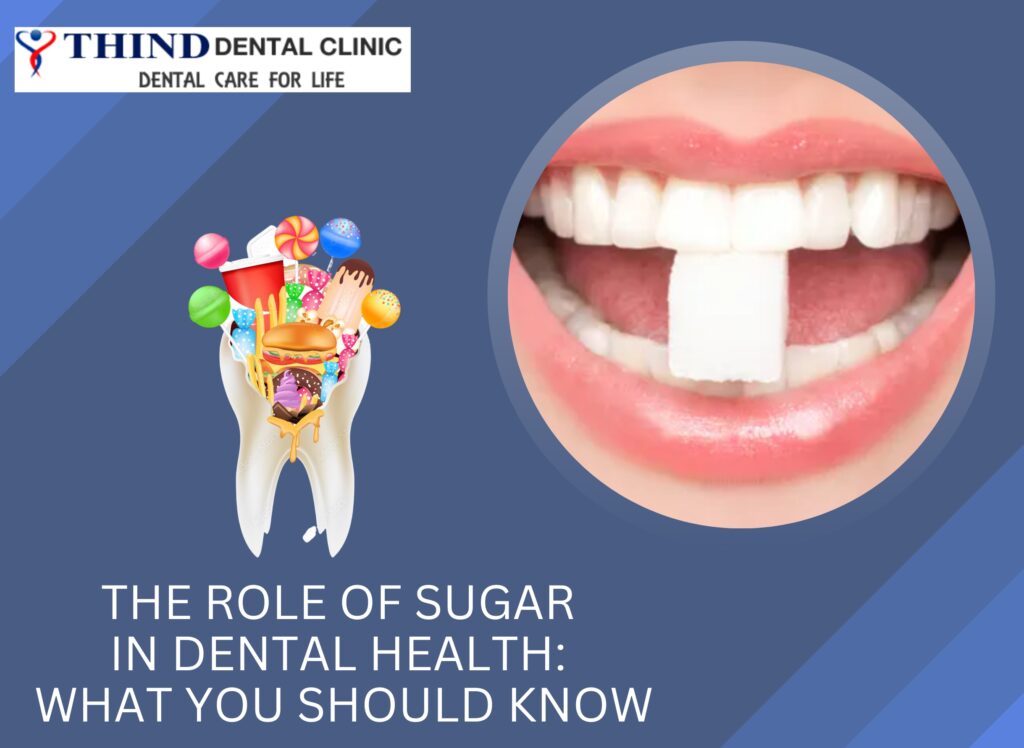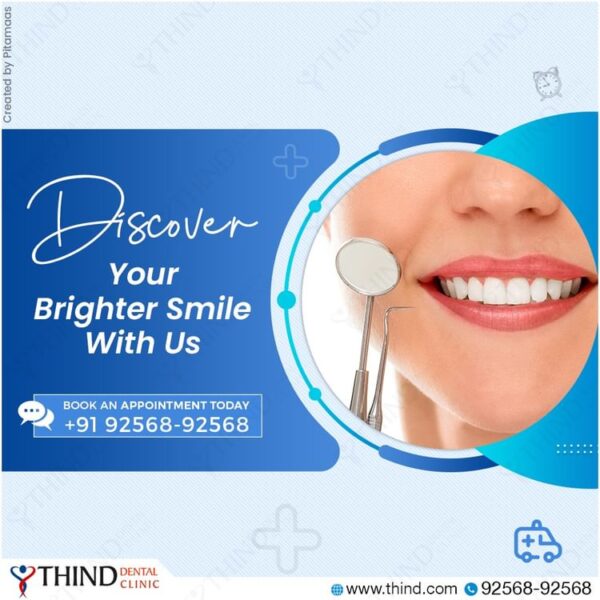Few things have as significant an impact on your dental health as the food you eat. Among these, sugar stands out as a key player, often associated with dental issues like cavities and gum disease. As you delve into the intricacies of sugar’s role in dental health, you’ll gain a deeper understanding of how to protect your teeth and maintain a radiant smile. At Thind Dental Clinic in Ludhiana, we are committed to ensuring that our patients are well-informed about the critical relationship between sugar and dental health.
Sugar: A Double-Edged Sword
Sugar is a carbohydrate that occurs naturally in a variety of meals, including fruits and vegetables. However, it’s also present in many processed foods and sweetened beverages. While sugar is a source of energy, excessive consumption, especially of added sugars, can lead to a variety of dental problems.
The Connection Between Sugar and Dental Issues
When you consume sugar, the bacteria in your mouth feed on it and produce acids. These acids can erode your tooth enamel, resulting in cavities. Additionally, the acids can irritate the gums, increasing the risk of gum disease. Over time, this damage can result in tooth decay and tooth loss.
Different Types of Sugar
1. Added Sugars: These are sugars and syrups that are intentionally added to foods and beverages during their processing, preparation, or cooking. Added sugars enhance the flavor, texture, and shelf life of many products but can be detrimental to dental health when consumed excessively. Common sources of added sugars include sugary drinks, candies, cookies, cakes, and various processed foods. These sugars are often referred to as “free sugars” and can contribute significantly to the development of dental problems like cavities and gum disease. When they are ingested, the bacteria in your mouth rapidly ferment and metabolize these sugars, producing acids that attack tooth enamel. Limiting the consumption of added sugars is a key step in protecting your teeth from decay.
2. Natural Sugars: Natural sugars are inherent in various whole foods and are found naturally in items such as fruits, vegetables, and milk. These sugars are typically accompanied by dietary fiber, vitamins, minerals, and other essential nutrients, making them a healthier choice for dental health. The presence of fiber in natural foods can help mitigate the potential negative effects of sugar on teeth. When you consume whole fruits or vegetables, the fiber within them can stimulate saliva production and promote chewing, aiding in the removal of food particles and the prevention of tooth decay. While natural sugars are not entirely risk-free, as they can still contribute to acid production when consumed in excess, they are less harmful to dental health compared to added sugars.
3. Complex Carbohydrates: Complex carbohydrates are a category of foods that primarily consist of starches and do not typically taste sweet. Common sources of complex carbohydrates include bread, rice, pasta, and grains. While these foods do break down into sugars during digestion, they have a less direct and immediate impact on dental health compared to added sugars. The enzymes in your saliva and digestive system break down complex carbohydrates gradually, causing a slower release of sugars into the mouth. This slow release is less likely to lead to rapid acid production, reducing the risk of tooth enamel erosion and cavities. Complex carbohydrates can be part of a balanced diet and are often a better choice for overall health compared to foods high in added sugars.
Sugar and Acid Production
The real culprit in the sugar-dental health equation is acid production. When bacteria feed on sugar, they generate acids that attack tooth enamel. Repeated acid attacks can eventually lead to cavities. Here’s the catch: it’s not just the amount of sugar you consume, but the frequency and duration of exposure that matter. Frequent snacking on sugary foods or sipping sugary drinks throughout the day can create a hostile environment for your teeth.
Protecting Your Dental Health
The good news is that you don’t have to eliminate sugar from your diet to maintain excellent dental health. Instead, it’s essential to practice moderation and implement some preventive measures.
1. Limit Sugar Consumption
Reduce your consumption of foods and drinks high in added sugars. When possible, choose sugar-free or low-sugar options. Be particularly cautious with sugary snacks and beverages between meals.
2. Choose Tooth-Friendly Foods
Incorporate foods that are kind to your teeth, such as fibrous fruits and vegetables, dairy products, and lean proteins. Chewing these foods can help stimulate saliva production, which naturally neutralizes acids and protects your teeth.
3. Practice Good Oral Hygiene
The foundation of excellent dental health is proper oral hygiene. Brush your teeth using fluoride toothpaste and a soft-bristled toothbrush at least twice a day. Floss at least once a day to eliminate food particles and plaque from between your teeth.
4. Rinse or Chew Gum
Rinsing your mouth with water or chewing sugar-free gum after consuming sugary foods or drinks can help cleanse your mouth and stimulate saliva production.
5. Regular Dental Check-ups
Routine visits to your dentist at Thind Dental Clinic in Ludhiana are crucial for the early detection of dental issues. Professional cleanings can also remove plaque and tartar buildup, preventing further dental problems.
Conclusion
Sugar’s role in dental health is undeniable, but it doesn’t have to be your smile’s arch-nemesis. With a balanced approach to sugar consumption, a diet rich in tooth-friendly foods, and diligent oral hygiene, you can protect your teeth and enjoy a radiant, healthy smile. At Thind Dental Clinic in Ludhiana, we are your partners in dental health, providing expert guidance and care to ensure your teeth stay in top condition. Remember, a smile is a lifelong asset, and it’s worth every effort to safeguard it.
For additional information or to arrange an appointment with us
You can contact us at +91-92568-92568
or visit us at:
THIND DENTAL CLINIC
11-12-13-14 H.I.G Market, Opposite Water Tank, Ludhiana, Punjab 141010.
Also Read:
Single Sitting Procedure: Painless and Affordable Dental Care at Thind Dental Clinic
Dental Care for Children: Expert Tips for Parents on Caring for Your Child’s Teeth
The Importance and Benefits of Regular Dental Checkups: Ensuring Optimal Oral Health
Professional Dental Implants: Restoring Smiles with Precision and Care at Thind Dental Clinic in Ludhiana

 Timings
Timings


